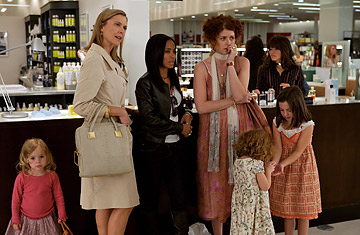
Annette Benning, Jada Pinkett Smith and Debra Messing in The Women
When The Women by Clare Boothe Luce opened on Broadway in 1936, Brooks Atkinson, the New York Times critic, snarled that it contained "some of the most odious harpies ever collected in one play." It nevertheless became a huge hit, despite the fact that there has never been any reason to question his judgment — not when the 1939 movie version came along, and certainly not now as we cringingly confront writer-director Diane English's completely miscalculated remake.
This "property" (one wouldn't want to dignify it with any grander term) comes complete with a gimmick: No man — not even among the extras — is ever seen or heard in it. The playwright's original text can be described as a hard-working woman's revenge on New York's idle rich, wasting their days on manicures, fashion shows and, above all, gossip. In updating the original, English — who was responsible for the estimable TV series Murphy Brown — has been fairly faithful to her source. Once again, the husband of Mary Haines (Meg Ryan) begins an affair with Crystal Allen (Eva Mendes), a perfume salesperson at Saks Fifth Avenue, which launches an arch and endless chatter that naturally makes a bad situation worse. A divorce ensues, and it requires what seems like 15 hours of screen time before a happy ending is achieved.
English has jettisoned some old-fashioned stuff, like the passage where Mary goes to Reno for her "quickie" divorce (there was, in those days, a six-week residency requirement). More important, she has given most of The Women's women jobs (notably Annette Bening's Sylvie, a hard-pressed magazine editor). She seems to want to convert her version of the play into a tract for our times; you know, something about the difficulties of having a family and a career simultaneously.
But that does not address the piece's fundamental problem, namely that it is not now and never has been funny. Or even human. In the previous movie version, as in this one (and I'll bet in the play itself) all the actresses strike comedic poses. They sashay about, rolling their eyes, pouting their lips, making big gestures and talking really fast. It's essentially an antique theatrical manner, the falsity of which the movie camera, dialing in for its close-ups (and even its two shots) exposes as relentlessly now as it did 69 years ago. No one ever gets to act — and this is a cast rich in good actresses — if by acting you mean the expression of authentic emotions. They are caught up in a zip-zap frenzy of words — and it is interesting how many lines in this script can be traced back to the Boothe original, which would not have been all that difficult to improve upon.
There are other problems, too. You can enjoy fast-track dialogue in television shows like Murphy Brown, because a well-written sitcom requires only 22 minutes of your time, not enough to make you weary of the rattling pace. But a movie, running a couple of hours, requires more breathing room — time to savor characters, time to let the knotty situations grow more enticingly tangled, time to enjoy a laugh if any of them are on offer. The constant hammering and yammering of this movie drives you out of involvement with its women. And then there's that perfume girl — so obviously a gold-digger, so entirely without redeeming traits. It's hard to believe that any sensible man, let alone a master of the Wall Street universe, would take such a creature out for a drink, let alone marry her, even back in 1936. She was a vulgar cliché when she rolled out of Luce's typewriter and neither time nor Diane English has improved her.
Or anything else, for that matter. Take this new invention, for example: Mary has a daughter named Molly (India Ennenga), who is a standard-issue adolescent Wise Child, victim-commentator on the adult follies proceeding around her. At one point she is discovered burning her tampons, symbolizing her desire not to become a woman. That's an understandable feeling, given the adult company she's been obliged to keep. But it's a stupid sequence, neither funny nor touching nor well prepared for. It is merely awkward and desperate, like everything else in this film, which is, in fact — and I'm choosing my words carefully here — one of the worst movies I've ever seen.
